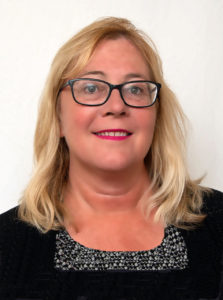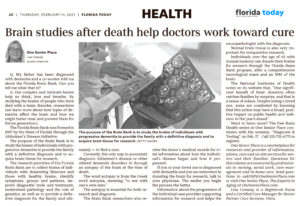
 Lisa Conway, One Senior Place – Special to FLORIDA TODAY
Lisa Conway, One Senior Place – Special to FLORIDA TODAY
Q: My father has been diagnosed with dementia and a co-worker told me about the Florida Brain Bank. Can you tell me what that is?
 A: Our complex and intricate brains help us think, love and breathe. By studying the brains of people who have died with a brain disorder, researchers can learn more about how types of dementia affect the brain and how we might better treat and prevent them for future generations.
A: Our complex and intricate brains help us think, love and breathe. By studying the brains of people who have died with a brain disorder, researchers can learn more about how types of dementia affect the brain and how we might better treat and prevent them for future generations.
The Florida Brain Bank was formed in 1987 by the State of Florida through the Alzheimer’s Disease Initiative.
The purpose of the Brain Bank is to study the brains of individuals with progressive dementia to provide the family with a definitive diagnosis and to acquire brain tissue for research.
The research priorities of the Florida Brain Bank are to collect brains of individuals with dementing illnesses and those with healthy brains, identify symptoms, groups and patterns, improve diagnostic tools and treatment, understand pathology and the role of genetics, as well as to provide a definitive diagnosis for the family and ultimately — to find a cure.
Currently, the only way to accurately diagnosis Alzheimer’s disease or other related dementia disorders is through an autopsy of the brain at the time of death.
The word autopsy is from the Greek word autopsia, meaning “to see with one’s own eyes.”
The autopsy is essential for both research and diagnosis.
The Brain Bank researchers also review the donor’s medical records for vital information about how the individual’s disease began and how it progressed.
If you or your loved one is diagnosed with dementia and you are interested in donating the brain for research, talk to your physician. The earlier you begin the process the better.
Information about the progression of the individual case provides supporting information for research and helps the neuropathologist with the diagnosis.
Normal brain tissue is also very important for comparative research.
Individuals over the age of 65 with normal memory can donate their brains for research through the Florida Brain Bank program, after a comprehensive neurological exam and an MRI of the brain.
The National Institutes of Health notes on its website that, “One significant benefit of brain donation often catches families by surprise, and that is a sense of solace. Despite losing a loved one, some are comforted by knowing that this action may have a broad, positive impact on public health and wellness in the years ahead.”
Want to learn more? The free Brain Health series at One Senior Place continues with the seminar, “Diagnosis & Testing” on Feb. 17. Call 321-751-6771 to register.
# # #
One Senior Place is a marketplace for resources and a provider of information, advice, care and on-site services for seniors and their families. Questions for this column are answered by professionals in nursing, social work, care management and in-home care. To submit a question, send an email to askOSP@OneSeniorPlace.com or visit One Senior Place, The Experts in Aging at OneSeniorPlace.com.
Lisa Conway is a Registered Nurse and a Certified Care Manager for Senior Partner Care Services in Viera.


